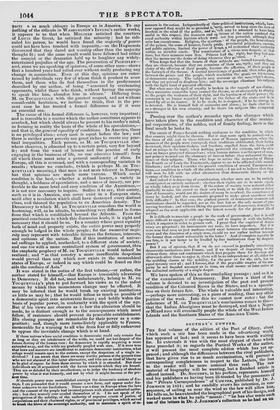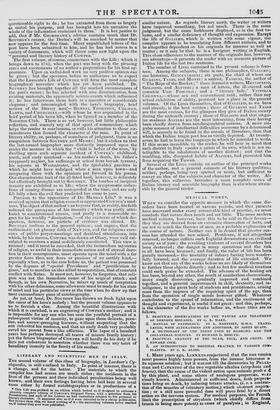SOUTHEY'S COWPER.
THE first volume of the edition of the Poet of Olney, about which such a stir has been made in the advertising world, has appeared at last; and it seems to have been worth waiting for. In externals it vies with the most elegant of those which have preceded it; as regards the Poetical Works of the author, it will present the most complete edition which has yet ap- peared; and although the differences between the rival publishers, that have given rise to so much recrimination, will prevent a corresponding completeness in respect to the Letters, the loss to the reader will be more nominal than real. The ray/ material of biography will be wanting, but a finished article is offered instead. Dr. SournEY, in his preface, represents himself and his publishers as having been ill-treated by the possessors of the "Private Correspondence" of COW PER, published by Dr. J. Jonnson in 1824; and he candidly avows his intention, in con- sequence, of sailing as near the wind as the law will allow him. He tells us, he has extended the biographical part of his design, and worked more in what be calls "mosaic :" "he has also made such use of the letters in Dr. J. Jot.' ?mores collection as he bad an un questionable right to do ; he has extracted from them as largely as suited his purpose, and has brought into his narrative the whole of the information contained in them." It is but justice to add, that if Mr. GRIMSH AWE'S edition contains much that Dr. SOUTHEY'S cannot, the Doctor's will be enriched by matter that now appears for the first time. Many unpublished letters of the poet have been submitted to him, and he has had access to a variety of documents, which will throw some new light upon the "personal and literary history of COWPER." The first volume, of course, commences with the Life; which it brings down to 1782, when the port was busy with the pleasing cares and excitements otan author's preparations for his first ap- pearance. Upon an unfinished work no very positive opinion can Fe given ; but the specimen before us authorizes us to expect that the Laureate's Life of COWPER will form the most complete biographical narrative which has yet been published. Dr. SOUTHEY has brought together all the marked circumstances of the poet's career; he has selected with nice discrimination, from existing materials, the, apparently minute events which influenced it ; he has interwoven them both in a narrative of considerable elegance; and intermingled with the hero's biography, brief notices of the literary men:— BONNEL THORNTON, COLMAN, LLOYD, and CHURCHILL—with whom he was acquainted in the brief period of his town life, when he figured as a member of the Nonsense Club. There is as yet, however, but little philosophic reflection, and scarcely any of that spirit of commentary which helps the reader to conclusions, or calls his attention to those cir- cumstances that formed the character of the man. In point of literary ability, or, perhaps, of soundness of judgment, there is no comparison between SOUTHEY and MEMRS ; but it strikes us that the last-named biographer more distinctly impressed upon the reader the manner in which the "child is father of the man," by dwelling upon each separate incident of COWPER'S childhood, youth, and early manhood— as his mother's death, his father's (supposed) neglect, his sufferings at school from boyish tyranny, his sojourn at Westminster, and the (probable) gayeties in which he might have indulged when a man upon town—and comparing them with the opinions put forward in his poems. One characteristic trait of the ill-fated bard, however, is delicately but effectively brought out by SOUTHEY. The touches of incipient insanity are exhibited as in life ; where the symptomatic indica- tions of coming disease are unregarded at the time, and are only felt fully when the evil they predicted has come to pass. Previous to the appearance of Dr. MEAtEs's Life,* it was a received opinion that religion caused or aggravated COWPER'S mad- ness. The object of that author was to prove that, in reality, his faith softened the paroxysms of his insanity ; which was partly attri- buted to constitutional causes, and partly to a reasonable re- gret for his worldly " dissipation, '—of the existence of which dis- sipation, however, no particle of evidence was offered. Dr. SOUTHEY inclines to the general opinion ; and argues, that the enthusiastic yet gloomy faith of NEWTON, and the religious exer- cises of public prayer-meetings and deathbed attendances, into which, by his means, Cowesa was drawn at Olney, were well cal- culated to overturn a mind so delicately constituted. This view is rational ; and it must be conceded, that the tremendous mysteries of religion, so awful in their immediate nature and of eternal dura- tion in their consequences, must operate upon the mind with a far greater force than any fears or passions of an earthly kind,— especially when, as in the case before us, the patient was possessed by the dogmas of "special Providence" and "justification by grace,' not to mention an idea allied to superstition, that of constant conflict with Satan. It must not, however, be forgotten, that reli- gion was not the immediate cause of his original attack ; and though, in his own Narrative, he mixes up much of temptation with his other delusions, some allowance must be made for his state of mind and his particular views at the time when he drew up that most extraordinary piece of autobiography. As yet, at least, Dr. SOUTHEY has thrown no fresh light upon the cause of his hero's malady ; but the present volume appears to us to furnish a clue. Among the beautiful illustrations with which it is enriched, is an engraving of COWPER'S Mother; and it is impossible for any one who has seen the youthful portrait of a subsequent victim of insanity, to gaze upon those delicate, pecu- liar, and sorrow-presaging features, without suspecting that the son inherited his madness, and that an early death very probably saved his parent from a like affliction. The lapse of a hundred years has perhaps destroyed all traces of minute family history; yet the future biographer of COWPER will hardly do his duty if he does not endeavour to ascertain whether there was any taint of hereditary insanity in the family of his mother.



























 Previous page
Previous page